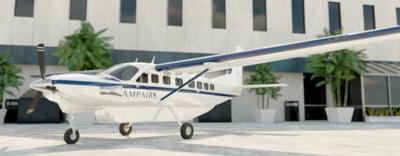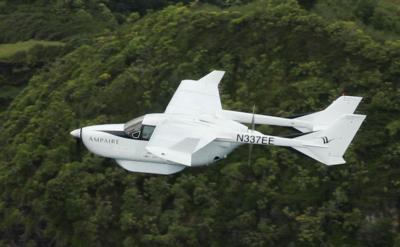Hybrid Electric Workhorse Undergoing FAA Type Certification
Founded in 2016 under the guiding principle of establishing itself as the world’s foremost developer of practical electric aircraft, Los Angeles-based Ampaire has made headlines and demonstrable progress toward upgrading existing utility aircraft to hybrid-electric power. The company intends to offer upgraded and all-new hybrid-electric aircraft, as well as—ultimately—fully electric aircraft.

On 15 September 2022, Ampaire announced it had entered into an exclusive agreement by which Electric Power Systems (EP Systems) will supply the propulsion battery pack for Ampaire’s Eco Caravan—a proprietary, hybrid-electric iteration of Cessna’s 208B Grand Caravan.
The nine-passenger Eco Caravan, which has undergone ground power tests and is slated to fly before the end of 2022, is the first hybrid-electric aircraft to enter into the FAA’s formal certification process. Ampaire expects the agency to issue supplemental type certification for the Eco Caravan in 2024.
The propulsion battery pack by which the Eco Caravan will be powered—EP Systems’ EPiC energy storage system—utilizes advanced cell technology that provides an energy density of over 200Wh/kg (watt-hours per kilogram) at the battery pack level. How much of that energy manifests at the propeller remains unknown. Under typical usage, the EPiC system is capable of undergoing two-thousand fast-charge cycles between replacements. What’s more, EP Systems’ EPiC series products consist of modular building blocks conducive to customization at the aircraft level.
Ampaire’s Electric EEL flying testbed aircraft—a Cessna 337 Skymaster equipped with one hybrid-electric propulsion unit and one conventional gasoline engine—was powered in part by a prototype of the EPiC system. That EEL is an inverted, backward illustration of 337 is as clever a bit of legerdemain as one is apt to encounter in the characteristically prosaic aerospace industry.
As the electric facet of the Eco Caravan’s hybrid propulsion architecture is to be powered by EP Systems’ EPiC battery pack, so the internal combustion facet will be powered by RED Aircraft’s A03 series engine—a four-stroke, 500-horsepower, V-12 diesel aircraft engine produced by RED Aircraft GmbH of Adenau, Germany.
Ampaire founder and CEO Kevin Noertker states: “We are working closely with fellow innovators to bring a new level of efficiency and low emissions to aviation. EP Systems has distinguished itself in tailoring its battery technology to our needs with a near-term certifiable solution.”

In comparison to the conventional, turboprop-powered Cessna 208B Grand Caravan, Ampaire claims its Eco Caravan reduces fuel and emissions by as much as 70% on shorter trips and 50% on longer ones—while preserving payload and extending range. The company further claims the Eco Caravan’s operating costs, contingent upon the mission flown, are 25% to 40% lower than those of the legacy 208B.
Ampaire’s hybrid-electric drive charges in flight. Ergo, the Eco Caravan requires no ground-charging infrastructure and can operate, ostensibly, across the selfsame remote, backcountry environs to which the legacy Grand Caravan is so eminently suited.
EP Systems founder and CEO Nathan Millecam adds: “Ampaire’s practical approach to electrification is the start of a transportation revolution. We share a vision of lowering costs for aircraft operators and their passengers, while moving as quickly as possible to zero emissions aviation.”
 Aero-News: Quote of the Day (12.07.25)
Aero-News: Quote of the Day (12.07.25) ANN's Daily Aero-Linx (12.07.25)
ANN's Daily Aero-Linx (12.07.25) NTSB Final Report: Lafferty Jack Sea Rey
NTSB Final Report: Lafferty Jack Sea Rey Classic Aero-TV: The B29 SuperFortress Doc - History in Flight
Classic Aero-TV: The B29 SuperFortress Doc - History in Flight Airborne 12.08.25: Samaritans Purse Hijack, FAA Med Relief, China Rocket Fail
Airborne 12.08.25: Samaritans Purse Hijack, FAA Med Relief, China Rocket Fail




